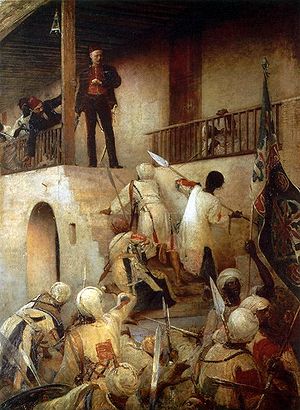This article needs additional citations for verification. (March 2020) |
| Siege of Khartoum | |||||||
|---|---|---|---|---|---|---|---|
| Part of the Mahdist War | |||||||
 Portrayal of Gordon's death by George W. Joy | |||||||
| |||||||
| Belligerents | |||||||
|
|
• Turco-Egyptian Sudan | ||||||
| Commanders and leaders | |||||||
|
|
| ||||||
| Strength | |||||||
| 30,000 to 50,000 troops |
7,000 troops 9 gunboats | ||||||
| Casualties and losses | |||||||
| Small | Entire force destroyed | ||||||
| ~4,000 civilians dead, many others enslaved | |||||||
The siege of Khartoum (also known as the battle of Khartoum or fall of Khartoum) took place from 13 March 1884 to 26 January 1885. Sudanese Mahdist forces captured the city of Khartoum from its Egyptian garrison, thereby gaining control over the whole of Sudan.
Egypt had conquered Sudan in 1820, but had itself come under British domination in 1882. In 1881, the Mahdist War began in Sudan, led by Muhammad Ahmad who claimed to be the Mahdi. The Egyptian Army was unable to suppress the revolt, being defeated in several battles and retreating to their garrisons. The British refused to send a military force to the area, instead appointing Charles George Gordon as Governor-General of Sudan, with orders to evacuate Khartoum and the other garrisons. Gordon arrived in Khartoum in February 1884, where he found it impossible to reach the other garrisons which were already besieged. Rather than evacuating immediately, Gordon began to fortify the city, which was cut off when the local tribes switched their support to the Mahdi. Approximately 7,000 Egyptian troops and 27,000 (mostly Sudanese) civilians were besieged in Khartoum by 30,000 Mahdist warriors, rising to 50,000 by the end of the siege.
Attempts by the defenders to break out of the city failed. Food supplies began to run out; they had been expected to last six months, but the siege went on for ten, so the garrison and civilian population began to starve. After months of public pressure, the British government reluctantly agreed to send troops to relieve the siege. With the relief column approaching, the Mahdists launched a night assault on Khartoum. They broke through the defences and killed the entire garrison, including Gordon. A further 4,000 male civilians were killed, while many women and children were enslaved. The relief expedition arrived two days later; realising they were too late, they withdrew from Sudan. The Mahdi then founded a religious state in Sudan, the Mahdiyah, which would last for fourteen years.